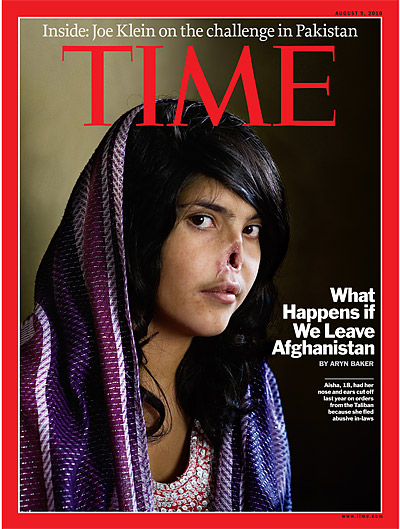
allahu akbar yourselves, kidz.
i-1
Taiwan, China, and other things. Recovered from the defunct TypePad platform.
Doesn't this count as "Desinification"? A Cultural Revolution even?
Births have traditionally dropped during the Chinese Year of the Tiger, as many believe that [Year of the] Tiger babies could be vicious and bring harm to relatives.
[KMT] Education Ministry official Yang Chang-yu challenged the belief that it is inauspicious to have babies in Tiger years, and noted many successful people are Tigers. People should try to have babies during this Year of the Tiger, insisted Yang.
And in order to debunk the traditional Chinese belief that Year of the Tiger babies are vicious and harmful, Yang presents Exhibits A and B:
People born in the Year of the Tiger include President Ma Ying-jeou, born in 1950, and Vice President Vincent Siew, born in 1938, Yang said. [emphasis added]
Honey, pass the prophylactics.
Stevie, what are your thoughts on all this?
(Direct YouTube link here)
It must be said that on the whole, I'm not a big fan of Taiwanese cuisine. So for that reason, I find myself agreeing with Michael's first comment on this thread. Nevertheless, it got me to wondering: What Taiwanese food DO I like?
The answers are on this short list I threw together. (Which I may add to later if I recall other things.)
Main courses:
1) Steamed fish.
Zhun yu in Mandarin, I believe. Westerners will have to get over the aesthetics of fish being served with head & tail intact. But do that, and you'll find a dish utterly amazing — hot and tender which melts in the mouth like butter. The very top of my list.
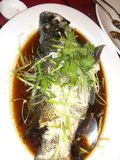
(Caveat: About 10-20% of the time, the restaurant will substitute some kind of cheap, oily fish for the usual one they use. And when that happens, zhun yu is kind of revolting.)
2) Stir-fried prawns with basil or garlic.
I don't know if these count as specifically "Taiwanese" food, but a couple of restaurants in the city of Zhong-li do these really well. I was never disappointed with them.
3) Stir-fried squid.
At least, I think they're squid. Little guys, about 2 1/2 inches long. Nice, salty taste. Not oily, but a bit rubbery at times.
4) Five-flavor octopus.
Thin slices of octopus served on a bed of shredded cabbage. Sweet, salty, sour, and spiced with ginger as well.
This one was hit and miss — I preferred it on the sweet / sour side, but the restaurants sometimes overpowered it with ginger.
Vegetarian dishes:
1) Pickled cabbage.
When I used to tell my friends in Taiwan that this was my second favorite Taiwanese food, they'd politely point out that pao t'sai, as it's called, is Korean, not Taiwanese.
No, no, I'd say. None of that red, garlic-flavored kim chee for me. I'm talkin' about the Taiwanese kind, sans garlic and with three simple ingredients: cabbage, a few carrot strips, and a sprinkling of chili pepper slices for color and kick.
(Pao t'sai's a real gamble, though. The first time I had it, it was sweet and sour and spicy and incredible. But usually it was unpalatable, being either too bland or too salty. Let the buyer beware.)
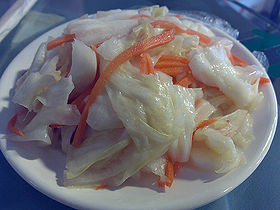
2) Japanese eggplant in chili sauce with garlic.
Completely changed the way I felt about eggplant. But if I ever find the recipe, I'd cut back on the oil.
Fast food:
1) Deep-fried squid tentacles.
These are about 4 inches long, with some kind of powder sprinkled on them. Superb. About the only Taiwanese fast food that I could stand. (Sorry, all you chicken feet and stinky tofu vendors!)
Desserts:
1) Strawberry rollmop cake from the 85 deg C cafe.
Taiwanese cakes and pastries were usually too bland on my palate to ever be a real temptation. Not so with this one. The cream inside? Made from
real berries.
2) Kinmen peanut brittle.
Pretty good. Could be sweeter.
3) Sour green mango slices on sweet ice.
(Probably out of season, but oh man, I wish I were in Taiwan having some of THIS right now . . .)
Miscellaneous:
1) Eggs scrambled with tomato slices & tomato sauce.
Not my absolute favorite, but deserves an honorable mention, nonetheless.
Postscript: Now that I look at it, this list is longer than I thought it'd be. But since I'm finished "accentuating the positive", it's only fair to point out a couple Taiwanese dishes I used to avoid:
1) Stir-fried chicken with bone fragments.
If there was any truth in advertising, that'd be the name. Apparently, Taiwanese chefs like to take a cleaver to meat on the bone, believing the resulting meat chunks will acquire taste during the cooking process from the tip-of-the-pinky size bones they contain.
Now, this may in fact be true, but the meat also ends up containing an unacceptably high number of tiny bone chips. Which must be murder on dental work and healthy molars alike.
My personal motto while eating out in Taiwan was always, "Just say, 'No,' to broken teeth."
2) Dong Po pork.
Mmmm . . . coronary on a plate. Picture a two-inch thick slab of pork. No – picture a two-inch deep ocean of corpuscular animal fat, sparsely populated with a few lonely islands of edible brown meat. That's Dong Po pork. One of the first dishes I ever tried in Taiwan; just recalling the experience is enough to provoke a case of psychosomatic angina.
When eating Dong Po pork remember: No matter how carefully you trim it away, you will be eating lots of sickly, translucent, artery-clogging fat. MOUTHFUL upon MOUTHFUL of it.
Best pay close attention to those gag reflexes, diners. Your body is indeed trying to tell you something.
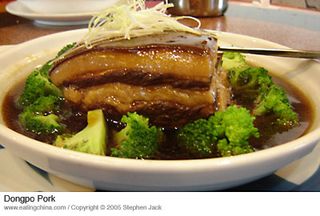
(Image from EatingChina.com)
UPDATE (Feb 20, 2010): A couple other favorites . . .
1) Hualien aboriginal BBQ pork.
Great smoky flavor. Best pork I've ever had.
2) Small abalone in the shell.
Has a red sauce with a sort of sweet & sour taste. Very nice.
i-3
While living in Taiwan, I was a big fan of Johnny Neihu in the Taipei Times. Breezy, well-written stuff. So I was very saddened to read last week that his weekly column has come to an end.
I'm sort of scratching my head over his final piece for the Times, though. I know he's saying something beneath the surface, but it's all a bit impenetrable to me. Whatever it is, my condolences on the death of your mother, Johnny.
Bye bye.
(Direct YouTube link here)
I received this comment on an old post about pigeon racing in Taiwan. Does anybody out there know the answer?
No, not all of 'em. (Duh!) But the reaction of a number of them to the Dalai Lama's visit last week following Typhoon Morakot left a lot to be desired. From the Aug 30th edition of the Taipei Times:
This is not an appropriate time for the Dalai Lama to come,” said Master Ching Liang (淨良法師), chairman of the Buddhist Association of the Republic of China.
Cheng Ming-kun (鄭銘坤), vice chairman of the Jenn Lann Temple (鎮瀾宮) in Taichung County’s Dajia Township (大甲) . . . said that while many local religious groups have been working diligently to help victims, the move “erases local religious groups’ credit.”
Fo Guang Shan Monastery (佛光山), a Kaohsiung-based Buddhist monastery that helped many storm victims, declined to comment, while the spokesman for the Buddhist Compassionate Relief Tzu Chi Foundation (慈濟), another organization that has been helping victims, could not be reached for comments as of press time.
Granted some of these may be Sino-imperialists in the Chinese Communist Party's pocket, but Taiwan's China Post alluded to another dynamic at work — good old-fashioned religious parochialism:
Buddhists in Taiwan are Mahayanists, not tantric Vajrayana followers. They, along with the Taoist majority, do not think tantric mantras and mudras would bring peace to the dead as well as the living. They are not pleased because they believe their priests can do a much better job than the Dalai, who could have stayed in Dharamsala and said as many masses as he pleased for the people of Taiwan.
Here the Post suggests opposition on the part of the laity where little actually existed, since it turns out that 75% of ordinary Taiwanese supported the Dalai Lama's mission to bring comfort to the survivors of the deceased.
Still, it stands to reason that the local CLERGY would believe that they could "do a much better job" than an outsider. Which reminds me of a story:
About a week after returning to the Old Country, an elderly uncle of mine died. Now, in his will he stipulated that an old fishing buddy of his (who happened to a minister) should be the one to give the service. These last wishes were complicated however, by the appearance of another minister, the man who apparently took excellent care of my uncle at the hospice. (I understand that the last few weeks were agonizing, once the cancer began attacking the nerve endings.) So this minister too, seemed to have good grounds for wanting to say a few words at the funeral.
The two might easily have come to an accomodation had it not been for yet ANOTHER minister. My uncle lived in a small town, where there was only ONE church of his denomination. And the head of this church was bound and determined that neither of these two interlopers would be given the opportunity participate in a ceremony on HIS home turf.
This crazy situation was only resolved when the family grew completely disgusted by the local minister's intransigence, and threatened to hold the service in the community center instead of his church. THAT made the local guy see reason — real fast.
True story, that. Seems to me that Taiwanese Buddhist clergy (and Christian preacher-men!) bring discredit upon themselves during times of tragedy when the best they can do is act like mutts peeing on fence posts to keep the other dawgs out of their territory. A quick reminder to clerics of any religion: When people die and families are grieving, it's not all about YOU.
Thank you, chairman J.T. Wang. I now know what computer brand NOT to buy.
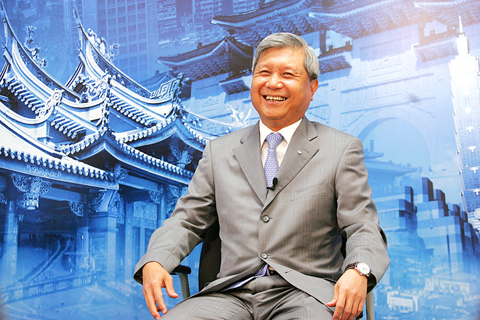
(Acer chairman image from the Taipei Times. I'll say this: Murdering Chinese free speech obviously pays well.)
i-1
On Tuesday it was revealed that Paul Sun, Taiwan's former Minister of Agriculture, had hired himself out as an unpaid adviser to a Chinese Communist Party agricultural organization. The response to his conflict of interest was swift and bi-partisanly negative, and rightfully so. The KMT is going to have to crack down hard on people like Sun, or else they fully deserve the charge of, "Sellout!" every time it's leveled at them.
Sun certainly did himself no favors when speaking in his own defense:
About 5,900 Taiwanese farmers or businessmen in the farming industry are in China, Sun said.
“If you view it positively, you can see it as helping Taiwanese farmers become more professional. If you view it negatively, then you can make many criticisms. From the positive side, I feel it is something worth promoting,” he said.
Taiwan’s agriculture should not be shut behind closed doors. Instead, people should open their minds to what is out there, he said.
Here he seems to be saying six thousand Taiwanese farmers in China should be helped at the expense of tens of thousands of Taiwanese farmers back in Taiwan. And for that, he deserves every bit of criticism that he gets.
However, there is one part of the story that seems to have been overlooked. After serving as Agriculture Minister, Sun went to work as chairman of Taiwan's Asian Vegetable Research and Development Center (AVRDC), which is a non-profit INTERNATIONAL institution. Yes, it receives money from Taiwan's national government. But it also receives money from the Bill Gates foundation and numerous other countries as well.
Now, if the AVRDC was a national institute, this would be an open-and-shut case. Taiwanese taxpayers contribute to fund the center, and they expect Taiwan's agricultural sector to bear the fruits of whatever research goes on there.
But since it's an international research center, the benefits of its research are supposed to be shared globally. Its mission statement isn't, "To help Taiwanese farmers," — its mission statement is, "To alleviate poverty and malnutrition in the developing world through the increased production and consumption of safe vegetables." And in fact, AVRDC has field offices in countries such as Thailand, Tanzania, India, Mali, Uzbekistan, South Korea, Camaroon, Madagasgar, Indonesia, Laos and the Solomon Islands.
There's another conflict-of-interest going on here, that I've just alluded to. As Agriculture Minister, Sun's job was to strengthen Taiwan's agricultural industry. But as chairman of AVRDC, his job is to help strengthen OTHER COUNTRIES' farm industries. Those are two very different sets of hats. The CEO of Monsanto has every right to quit and pursue his life-long dream of becoming the next Johnny Appleseed. Monsanto however, has every right to be concerned that its former Chief Executive Officer may be giving away proprietary information.
Same deal applies here. An investigation should be conducted into Mr. Sun, because during his stint as Ag Minister, he had access to techniques and cultivars developed by national institutions, which were intended to benefit Taiwanese farmers only. If that's what he gave to China, then he's harmed Taiwan greatly. But, if he only gave them techniques and cultivars developed by the AVRDC, then he was only doing his job of diseminating the Center's research to the world.
(And, just to reiterate, whatever the outcome of that investigation, he should still be punished for taking a job in the PRC, creating an obvious conflict of interest.)
Since I don't read Chinese, I don't really have any personal stake in the debate Taiwanese president Ma Ying-jeou started a few days ago about whether Taiwanese should learn the Simplified Chinese characters that are used in China, or whether Chinese should learn the Traditional characters used in Taiwan.
Nonetheless, the fact that the topic is being broached now gives the lie to Ma's claim that his "One-China Trade Market" is an economic issue only. Because if China truly is Taiwan's economic savior and an agreement is reached, then some sort of linguistic harmonization is going to take place. Business between the two countries will need to communicate intelligibly with each other. As foreigners we're all aware of the efforts Taiwanese make to learn English — similar efforts to learn Simplified script may someday also be undertaken.
Without making any value judgments about this, it's clear that the Chinese Nationalist Party's "One-China Trade Market" is not just an economic issue, but a cultural issue as well. Will the Taiwanese be permitted to have anything to say about a policy which affects these two areas?
Not if the KMT has anything to do with it. The unwashed proles mustn't be allowed to vote on issues already decided upon by their political betters.
The Simplified vs. Traditional character proposal also finds its origins in the Chinese Nationalist Party's "One-China Educational Market" as well. Once Taiwanese students begin studying in China, they'll need to be able to write using Simplified characters, while Chinese students in Taiwan will need to be able to read Traditional characters. And it's dishonest for anyone to claim that this isn't going to have a cultural impact.
Postscript: An even more dishonest argument that's being made is that opening Taiwan's educational system to Chinese will increase the number of students in Taiwanese universities.
Well, of course the number of CHINESE students in Taiwan will increase, but since Taiwanese students will also leave the country to study in China, the number of TAIWANESE students here will necessarily decrease.
Whether there'll be a net gain or loss is anybody's guess. * But what's truly maddening is that the same people who loudly trumpet the GAINS from an influx of Chinese students are noticibly quiet when it comes to mentioning the LOSSES from the expected China-bound exit of Taiwanese students.
Which suggests that those in favor of the "One-China Educational Market" aren't really interested in the net result at all, and that they're actually arguing in bad faith . . .
* Did I say anybody's guess? Leaving aside the issue of the difference in tuition rates, there was an interesting story recently that the Taiwanese government would like to raise the educational requirements for university entrance.
Of course, no one wants to climb up on a soap box and speak in favor of low educational standards. But raising entrance requirements will inevitably lock some Taiwanese students out of the Taiwanese university system.
Leaving them with nowhere to go, but less picky universities in the People's Republic of China. Or as the KMT calls it, "Mother China".
I just KNEW I'd written a post on this topic before. August of 2007 . . . lotta water under the bridge:
Should Chinese Students Be Permitted To Study In Taiwan?
Pretty long (4 screens), but thorough. To be entirely honest, you might be able to get away with skipping the first screen.
How do I track down a birds owner in Taiwan?
The tag only has a number on it, and the year. Nothing else.